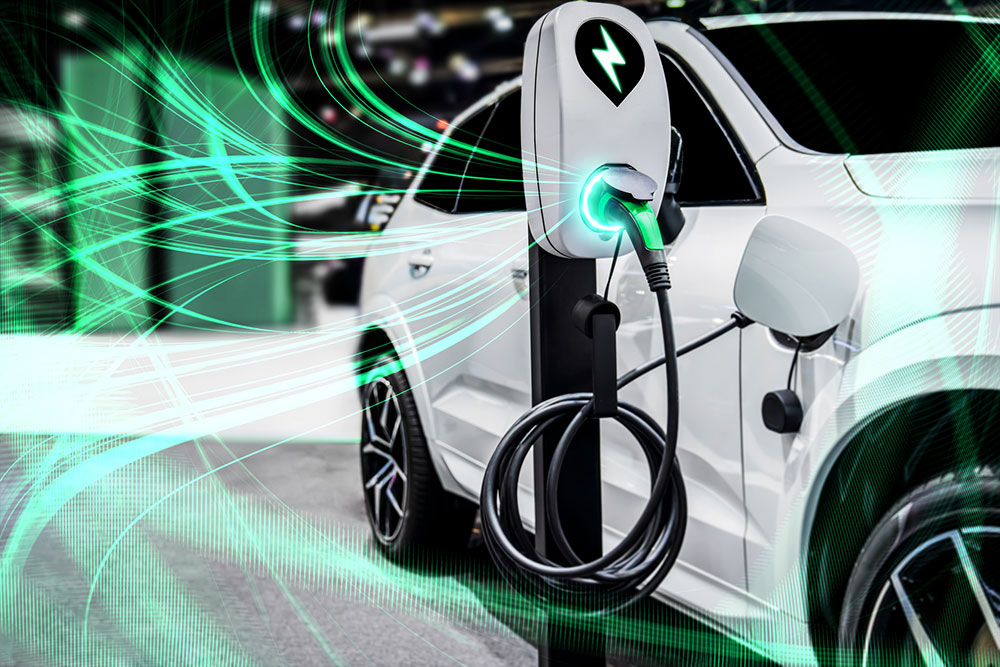Tech track: Genesis unveils hi-tech new features

Genesis Motor Europe is introducing a number of new state-of-the art biometric features to the GV60 on the 2023 model.
The GV60 will offer the world’s first face recognition technology for keyless entry along with additional tech features such as digital key and air purification system.
Using a facial recognition sensor with a deep-learning image processing controller, the GV60 will be able to be both locked and unlocked without the need for a key.
The process uses an LED indicator located on the B-pillar, which will provide visual feedback on the status of the vehicle.
A new digital key feature will also be available with the 2023 model. This will allow owners to lock or unlock the vehicle using their smartphone or smartwatch.
The digital key system will welcome owners when approaching the vehicle by opening the wing mirrors and turning on the puddle lamps.
A new air purification system is also being introduced.
This includes a high-performance premium air filter, which detects the quality of the air in the cabin and automatically activates when the level of dust concentration increases.
Solid news on batteries
It seems there are breakthroughs in new battery technology occurring every week lately.
A team of scientists from Australia and Japan say they have made a breakthrough in the manufacture of durable solid-state batteries they say could ‘drastically reduce’ the cost of electric vehicles while also enabling them to recharge much faster.
The majority of current electric vehicles use lithium-ion batteries, which due to rising mineral costs are struggling to deliver performance and durability at a competitive price.
While current solid-state batteries offer increased safety, due to not having a flammable liquid electrolyte, they have much less durability due to permanent electrode damage that occurs when the battery is discharged and recharged.
The research team led by Professor Naoaki Yabuuchi of Yokohama National University in Japan, tested a new positive electrode material in an all-solid-state cell by combining it with an appropriate solid electrolyte and a negative electrode.
The material used by the research team combines optimised portions of lithium titanate (Li2TiO3) and lithium vanadium dioxide (LiVO2).
The team says that at the right particle size (nanometre sized) the material’s large quantity of lithium ions can be reversibly inserted and extracted during the charge/discharge process, resulting in high capacity.
The research team said through further improvements, it may soon be possible to manufacture batteries that are good enough for electric vehicles in terms of price, safety, capacity, charging speed and lifespan.
Plug in to the electric future
Related topics
Things to note
The information in this article has been prepared for general information purposes only and is not intended as legal advice or specific advice to any particular person. Any advice contained in the document is general advice, not intended as legal advice or professional advice and does not take into account any person’s particular circumstances. Before acting on anything based on this advice you should consider its appropriateness to you, having regard to your objectives and needs.
Insurance Products (excluding Travel Insurance) are issued by RACQ Insurance Limited ABN 50 009 704 152 (RACQI) and arranged by RACQ Distribution Services Pty Ltd (RDS) ABN 35 116 361 650, AFSL 567130 and RDS' authorised representatives (including RACQ Operations Pty Ltd ABN 80 009 663 414, AR No. 234978 (RACQO)). Conditions, limits and exclusions apply.
Any advice provided by RDS and RACQO is general advice only and does not take into account your personal objectives, financial situation or needs and you will need to consider whether the advice is appropriate for you. Read the Product Disclosure Statement (PDS) before making a purchase decision on the product. You can also access our Target Market Determinations on this website.
RDS receives a commission from RACQI for the policies it arranges. RACQO receives fees paid for services it provides to RDS. Further details about remuneration are available on request prior to purchasing.
Banking and loan products issued by Members Banking Group Limited ABN 83 087 651 054 AFSL/Australian credit licence 241195 trading as RACQ Bank. Terms, conditions, fees, charges and lending policies apply. This is general advice only and may not be right for you. This information does not take your personal objectives, circumstances or needs into account. Read the disclosure documents for your selected product or service, including the Financial Services Guide and the Terms and Conditions, and consider if appropriate for you before deciding.
Except for RACQ Bank, any RACQ entity referred to on this page is not an authorised deposit-taking institution for the purposes of the Banking Act 1959 (Cth). That entity’s obligations do not represent deposits or other liabilities of RACQ Bank. RACQ Bank does not guarantee or otherwise provide assurance in respect of the obligations of that entity, unless noted otherwise.
RACQ Bank subscribes to the Customer Owned Banking Code of Practice which establishes higher standards than the law requires. The Code reflects modern consumer expectations and developments in approaches to issues such as consumer vulnerability, guarantors, and supporting customers through financial hardship. Please read our Customer Owned Banking Code of Practice page for more information.
RACQ Operations Pty Ltd (ABN 80 009 663 414 AR 000234978) and Members Travel Group Pty Ltd (ABN 45 144 538 803 AR 000432492) are acting as an Authorised Representative of the issuer of the insurance, Tokio Marine & Nichido Fire Insurance Co., Ltd. (ABN 80 000 438 291 AFSL 246 548). Any advice set out above is general in nature only, and does not take into account your objectives, financial situation or needs. Before purchasing any travel products, please consider the RACQ Travel Insurance Product Disclosure Statement (PDS) and the Target Market Determinations (TMDs) that apply to these products. Whilst the PDS outlines the Terms and Conditions of these products, the TMDs outline the intended class of customers that comprise the target market for these travel products. This will allow you to consider which products best suit your objectives, financial situation and needs and consider the products appropriateness to your personal circumstances. TMDs also outline matters involving the distribution and the review of these products. The PDS, Supplementary PDS and TMDs for each travel product can be found here.
